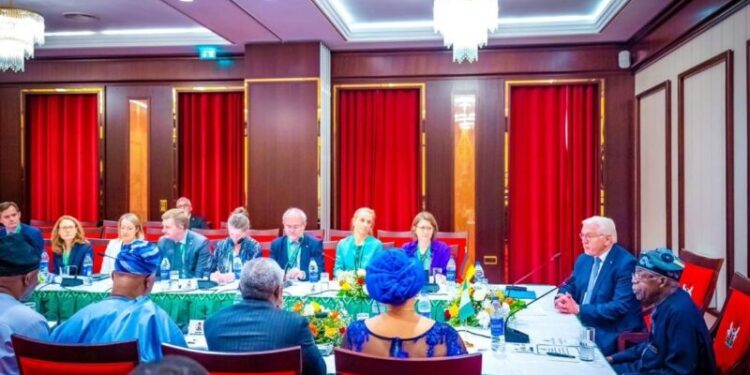President Bola Tinubu, on Wednesday, assured the German government and businessmen of Nigeria’s preparedness to expand frontiers for investors by removing administrative bottlenecks in the energy and solid minerals sectors.
Tinubu said this at a business session during the State Visit of Mr Frank-Walter Steinmeier, the German President, at the Presidential Villa, Abuja.
He said activation of the latent potential in the energy sector remained central to Nigeria’s development.
“I welcome Mr President to Nigeria and the State House. Your visit is a significant milestone. And I must thank you for the warm reception when I visited Germany.
“We need each other, and you emphasised this in our private discussion. Nigeria is going through a transformative period and trying to align with the best strategy and practices on good governance globally.
“We like our relationship with you as friends and partners. Germany is well-industrialised and renowned for its sustainable infrastructure,” Tinubu said.
He reassured the German businessmen that Nigeria was ready and open for business.
“As you mentioned, you are ready to support Nigeria in the energy sector, which you have long been doing.
“Also, in alternative energy, we have the sun, and you have the technology. We should continue our partnership in every way that we can,” said the President.
Tinubu said the Ministries of Foreign Affairs, Solid Minerals, Power, Industry, Trade and Investment had been directed to work closely with investors to develop the energy sector.
“I will re-emphasise again and again, we must enhance the possibility of becoming highly industrialised by exploring opportunities in our natural resources,” he added.
Tinubu said the country’s reforms had been designed to bring long-term prosperity through sustainable and dependable frameworks.
“We are synchronising to ensure a grounded and flourishing partnership that brings prosperity to our people. We know that Germany has the capacity and is involved in regional cooperation and collaboration.
“We are glad that we are trading in Euro with you. We are more transformative than before. We have made changes in the way we do business. It is now easy in and easy out for investors.
“We are projecting investment in gas and alternative energy. Our transformation involves natural gas.
“We are leveraging solid minerals, particularly lithium. We have a dynamic, anxious-to-learn and flexible youth population.
“We have many Nigerian students who were trained in Germany. We want domestic investment that will promote growth in our economy. Equally, we need skill development,” the President said.
Tinubu noted that Small and Medium Enterprises were also being repositioned to play a more central role in development, assuring that bottlenecks to investments had been removed.
In his remarks, the German President assured Tinubu that there were also more specialised companies in Germany that would be encouraged to look towards Nigeria for expansion opportunities beyond the big brands in the energy sectors.
“There is a growing interest in Nigeria on the German side beyond those who are already here, like Siemens. Other companies are looking for investment opportunities, especially in renewable energy,” he stated.
In his presentation, Mr Dele Alake, the Minister of Solid Minerals Development, said Germany had a dedicated one billion Euro fund for diversifying the supply chain in renewable energy, and modifying the conditions could easily accommodate the opportunities in Nigeria’s solid minerals sector.
Alake said the critical minerals for energy transition, cobalt, nickel and lithium, were readily available in Nigeria.
“German companies can come in under the Renewed Hope Agenda that has sanitised the environment, enhanced security with a new architecture around solid minerals, created tax incentives and waivers for important equipment and provided opportunities for joint ventures,” he said.
He said pre-feasibility studies had been concluded, urging German investors to look to Nigeria for diversification of the energy supply chain.
Mr Wale Edun, the Minister of Finance and Coordinating Minister of the Economy; Dr Jumoke Oduwole, Minister of Industry, Trade and Investment; and Mr Adebayo Adelabu, Minister of Power, also made presentations at the business meeting.
The business delegation from Germany and their Nigerian counterparts commended President Tinubu for his long-term vision for the economy.
They also praised his courageous steps in repositioning Nigeria for greater prosperity by making the economy more globally competitive with streamlined foreign exchange and improved ease of doing business. (NAN)











